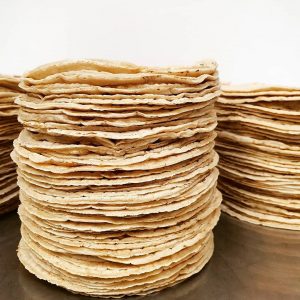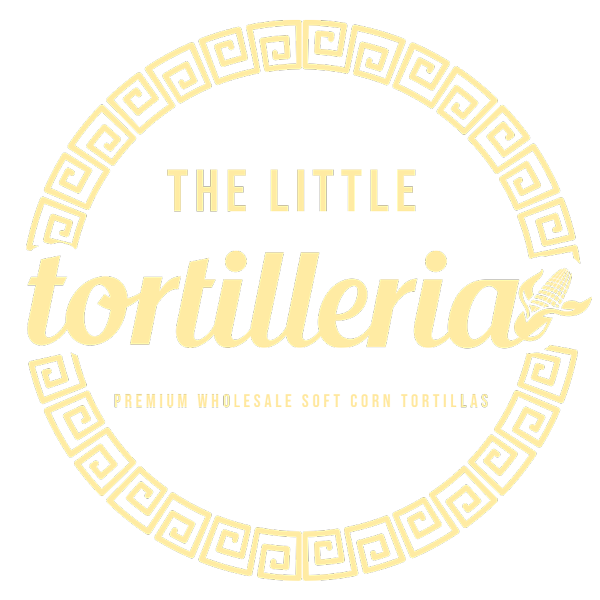How to make soft corn tortillas
Making the best soft corn tortillas takes some practise. Take it from us, we’ve been making them for our taco truck and for our customers for over seven years. Proper corn tortillas should be naturally gluten-free, they should be soft yet strong and they should taste like corn.
Once mastered, you have achieved the cornerstone in Mexican and Central American cooking and you’ll soon be feasting on delicious tacos, quesadillas, totopos, tostadas and more..
In Mexico there is a tortilleria in every town, supplying the local community with fresh tortillas each morning, just like the milkman. Tortillas have been made in Mexico and Central America since for thousands of years by the Mayans and are a great source of fibre and magnesium, they are lower in calories and carbohydrate than their flour counterparts and are lower in fat.
Wheat did not exist in Mexico until the Spanish introduced it in the 1500s. The Aztecs developed a process to turn corn into ‘Nixtamal’ which is more digestible, nutritious, and flavourful. This nixtamal is created by soaking the corn in lime and ultimately leads to Masa Harina (corn flour) which is what we use to make tortillas.
Making soft corn tortillas
Making tortillas at home should be very straightforward but it is very easy to make mistakes and be left with brittle and dry tortillas. The ingredients list is short but experience and practise should not be underestimated.
Masa Harina
Masa Harina or Corn flour should not be mistaken for corn meal, polenta or the stuff we use to thicken gravy! This should be 100% nixtamalised corn. Masa Harina varies in quality hugely, look out for Non-GMO. In our experience the best brands (in order) are:
1.Naturelo
2.Maseca (white)
3.Minsa (lacks the corn taste in our opionion)
4.Maseca (blue, too coarse)
5.Pan (not great for tortillas but best used for arepas and gorditas)

We stock Naturelo in blue and white in our store
Water
Water is a key component in making soft corn tortillas. Different masa brands seem to hold different amounts of water and the masa : water ratio is one of the keys to creating the perfect consistency tortilla.
The water should be warm, not cold, not tepid, warm. This can affect the taste as the warm water helps rehydrate the nixtamal and unlocks the flavour.
Salt
Use good quality salt. The grain should be as fine as you can find it. Avoid cheap table salt as these tend to contain microplastics – not good for anyone!
Equipment for making soft corn tortillas
If you’ve been to Mexico or Central America you probably would have seen lovely old ladies making tortillas in an outdoor kitchen with just their hands. They are effortlessly skilled at this and have no doubt learnt from a very young age. It shows that no pressing equipment is necessary but if you don’t have years to master this you might want to pick up a press.
Tortilla Press
This is the most common way of making tortillas at home. You can improvise with a heavy bowl or rolling pin but this will save you a lot of time.
Not all tortilla presses are made equal. Avoid flimsy aluminium presses and go with either a cast iron or wooden press. Wood can look great in a kitchen but if you struggle for counter space you might want to consider the more compact cast iron press.

Cast Iron presses are available from our store.
Mixer
Masa dough has to be mixed well. Unlike bread dough made with wheat it does not have gluten so it can be hard on the hands and wrists. The most essential part of making tortillas is making sure the dough is mixed thoroughly. If you decide to use a mixer make sure you use a dough hook and not a paddle attachment. The dough is much harder than bread dough and you mixer will have to work harder. We went through 3 paddles and 2 mixers before we learnt this crucial lesson.
Comal
Tortillas are traditionally cooked on a comal (a smooth flat griddle, usually made from clay). You can heat tortillas on any large flat frying pan or griddle but make sure it can withstand a lot of heat while it’s empty. Sometimes this means that non-stick pans aren’t the best.
Tortilla Warmer
Apart from the perfect dough consistency, achieved by the right water/masa ratio and thorough mixing, this is the most important, and often forgotten step in making soft corn tortillas. Tortillas once they have been cooked must be kept warm. You should not serve tortillas directly onto a plate without giving them some time in a tortilla warmer. The warmer not only keeps them warm, it more importantly keeps them soft by steaming them. This ensures that your tortillas are soft, yet strong when you serve them rather than being hard and brittle.

The type of tortilla warmer is down to personal taste. A clean tea towel will do but it won’t keep your tortillas warm for very long. We sell plastic tortilla warmers in our store. Traditionally clay pots are used.
Recipe for soft corn tortillas
Our recipe is based on using Naturelo Masa Harina. As we mentioned previously, different brands hold different amounts of water. We find this is perfect for us when using a mixer.
500g Masa Harina (Naturelo)
600ml Warm water (as hot as it will come out of your tap)
Pinch of good quality salt.

How to use a tortilla press
A tortilla press is not ready to go straight out of the box. You’ll need to prepare it. You will need either some cling film or plastic food bags. Cover both paddles of the tortilla press with the cling film and secure to create a tight, ripple free surface between the paddles. Test to make sure the paddles can close together tightly and you haven’t interfered with the hinges.
Roll a piece of your dough between your hands to create a ping pong ball sized ball. If the dough cracks it could be due to one of two reasons (please read the Common problems and solutions section). Place the ball in the centre of the tortilla press and use the lever to press down gently at first and progressively harder. The ball should be squashed perfectly into a circle about 2mm thick. Repeat press if required to make the tortilla thinner. If the dough has spilled out the sides you may have used too much dough for the size of the press. A perfect size tortilla for tacos should be between 10-13cm.
Method for making authentic soft corn tortillas
- Empty your flour into a bowl and sprinkle over the salt.
- Mix together and create a well in the centre.
- Empty the warm water and mix thoroughly.
- Bring the dough out of the bowl (it should be sticky enough to grab the loose bits of dough but not so sticky it sticks to the bowl).
- Knead the dough by hand until it feels soft and smooth but does not stick to your hands.
- Divide the dough into ping pong sized balls and place back in the bowl with a damp tea towel over the top.
- Place a shallow pan or comal over a high heat and wait for it to reach temperature.
- Press a dough ball using the press and peel off the tortilla gently and place on the pan.
- Add more tortillas to the pan if there is space but avoid letting them touch.
- Leave for 20-30 seconds (do not be tempted to adjust or move them on the pan during this time)
- Flip the tortillas and toast for another 20-30 seconds.
- Flip a third time and give the tortilla a little rub with the back of your chosen flipping utensil (this might encourage it to start to ‘puff up’. If so, well done you’ve just cooked the perfect tortilla!).
- Remove the tortilla and place in a tortilla warmer for a minimum of 2-3 mins.
- Serve!
Uses for tortillas
We love tacos! We could literally live off them, that’s why we started a taco truck back in 2015. Tortillas are the cornerstone of Mexican cooking and are so versatile. Even when they are starting to go a bit hard and stale you can chop them up into triangles and fry them to make tortilla chips or fry/bake whole ones into tostadas. Cut them into strips to make croutons for tortilla soup or salads or bake them into enchiladas. Check out our other recipes to use tortillas.
Common problems and solutions
My dough seems too wet
If it’s not the obvious reason of using too much water and not enough flour it might just be that you need to continue mixing a bit longer. Sometimes the dough can appear too wet and sticky but there are still dry patches of flour hiding in the corners of the bowl. Keep mixing and if that doesn’t work maybe add a touch of flour slowly.
My dough is cracking or crumbly
Assuming you’ve used the correct amount of water your dough is probably not mixed for long enough. Keep at it, or return it to the mixer. Alternatively this can happen a bit on particularly hot days or when kneading dough on wooden surfaces which absorb the water. Spritz the dough with a bit of water and work the water in to create the perfect consistency. The quality of the flour can also cause this. If it is a particularly course flour it can be a bit of a nightmare getting a good result.
My tortillas are too thick
This is quite common with some tortilla presses which is why we have gone to lengths to source the best we can find for our store. Sometimes no amount of pressing can get the tortillas as thin as when you buy them from a tortilleria. Tortilleria’s use specialist machinery which enables them to adjust the thickness as they had through their rollers. You can try using a smaller ball of dough and then a rolling pin after the press but unfortunately this is quite common with home made tortillas.
The tortillas are sticking to the pan
The pan may not be clean or seasoned well enough to create a nice non-stick surface or it may have not heated up enough before placing the tortillas. Avoid attempting to move the tortillas on the pan until at least 20 seconds has passed. The dough being too wet could also cause this.
